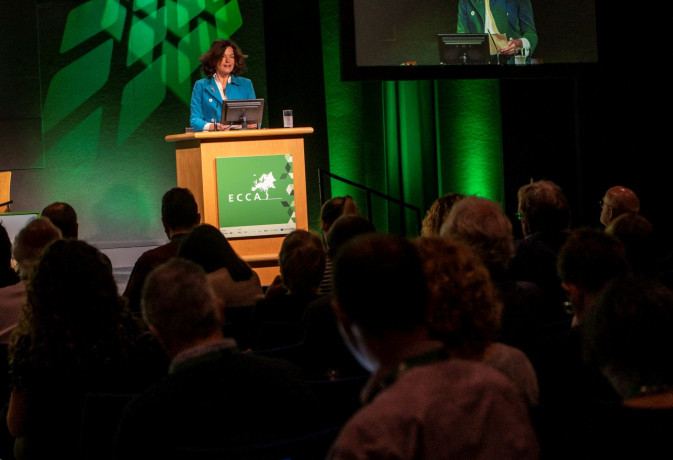From across Europe, key scientific and policy influencers had a common message at the opening of ECCA2023 – the transfer of climate science into climate adaptation needs to accelerate.
Nowhere was this more clearly illustrated than Ukraine. The country’s scientific and policy delegation set out the sobering impact of the illegal invasion by Russia in terms of the human cost and the legacy of financial impacts, food, energy and water supplies, living conditions and infrastructure.
Following a welcome for the in-person audience of 450 plus nearly 1,000 joining online, by Eimear Cotter, Environment Protection Agency (EPA), Ireland, the keynote speaker was John Bell, of the European Commission, DG Research and Innovation.
While praising the work of the hundreds of scientists and funders in the packed Printworks Conference Centre, in Dublin, Ireland, he drew attention to the vital next step – getting the research put into action. He said: “We all know we’ve got to change, so how do we change?”
He added: “We need to get to the causes of our over-heating planet and explain in ways that people taking decisions understand.”
He went on to describe this as a ‘decade of decision’ fearing the increasing impact of climate change on people’s physical and mental health, the consequences of more frequent extreme weather events and of climate change contributing to a housing crisis as populations were displaced. He called on science and research to work ‘in a different way’ to drive take-up of adaptation measures and said that ECCA, now in its 6th edition, had been showing the way. He said the European Commission’s Adaptation Mission has to take the work of science and research ‘and drive it across Europe’ including to reach local authorities, referring to the Mission’s target of creating at least 150 resilient communities in Europe by the end of the decade.
Panel debates set the scene for ECCA2023
Then the scene for the 6th European Climate Change Adaptation Conference was set by Petra Manderscheid, Belgium Science Policy Office, Belspo followed by a fascinating look back at Dublin’s long history of Adaptation by Conor Quinlan of EPA.
Frank McGovern, Chair of co-organisers of the conference JPI Climate and Chief climate scientist with the EPA, held the first panel discussion of ECCA2023. Hans-Otto Pörtner picked up the theme of accelerating adaptation, saying: “Heat protection measures are urgently needed and another challenge we have is with water – we see places in Europe where water is no longer a given.” Going on to refer to the climate challenges facing agriculture, including needing to move back from industrial agriculture and changing society’s eating habits, he also picked out flood risk and sea level rise, admitting: “We may have to give land back to the oceans.”
Andrew Ferrone, lead author of the WMO and Copernicus Climate Change Service Report on State of the Climate in Europe 2022, referred back to the previous day’s launch of the report in Dublin. He mentioned vulnerable infrastructure services such as hospitals and schools, saying: “We need to present solutions and best practices and work together with society and politicians.”
Blaz Kurnik, Head of Climate Change Impacts and Adaptation Group, María Sanz, Scientific Director B3C and Nadia Pinardi, Director, UN Decade Collaborative Center on Coastal Resilience, completed the panel.
Hans-Otto concluded, saying: “The most challenging question of our time is how to implement solutions and how to be fast enough – that’s the most important.”
A second panel, chaired by Paul Watkiss, of Paul Watkiss Associates, focused on enabling innovation and the role of financial flows, featuring Kirsten Dunlop of Climate KIC and Lorenzo Pezzati, Council of Europe Development Bank, the European Investment Bank, the Central Bank Ireland and the Bank of the Council of Europe on how to succeed in enabling adaptation solutions on the ground. They discussed the conditions that enable innovation and how to create those conditions and the vital role of inspiring society to make changes.
Voice of youth
Their comments about intergenerational responsibility led neatly on to the final discussion in which MC Karen Coleman, of EU News Radio, interviewed two young climate activists, Katarzyna Smętek, Polish climate advocate and Oileán Carter Stritch, Ireland’s Climate Youth Leader. Katarzyna gave a warning not to judge individuals by their level of climate action or to undermine their efforts but to empower everyone to take some kind of action. Oileán added: “Young people don’t want to engage with just doom and gloom in their free time.”
The morning concluded with a rousing speech from Ukraine’s Ambassador to Ireland, Larysa Gerasko, who addressed the opening plenary audience with passion but also with commitment to a post-peace recovery, dedicated to building back better and greener.
She said after her speech received a standing ovation: “This conference is very important for the whole world and especially for Ukraine because consequences of the war on Ukraine’s ecosystem are huge so we want to draw attention of the global community to our problem”.
“This is not only a Ukraine problem it’s a global problem because of the consequences of the war on the whole planet. We are looking for support in assistance in fighting these consequences.”
Ukraine’s leading climate scientist, Svitlana Krakovska added: “We should not consider any recovery without adaptation to climate change. From one point of view it’s a disaster but [the recovery] is also an opportunity to rebuild better and greener.”

Highlights of ECCA2023 conference on Tuesday 20th, 2023
Watch the live stream of the ECCA2023 opening plenary on YouTube: https://www.youtube.com/watch?v=jmSuvtsX968
Read more about ECCA2023 here
Explore the photo galleries from:
-ECCA2023 Monday 19 June, 2023 here.
-ECCA2023 Tuesday 20 June, 2023 here.
-ECCA2023 Wednesday 21 June, 2023 here.
-ECCA2023 Extra photos (side events, creative arts, presentations, workshops, etc.) here.
